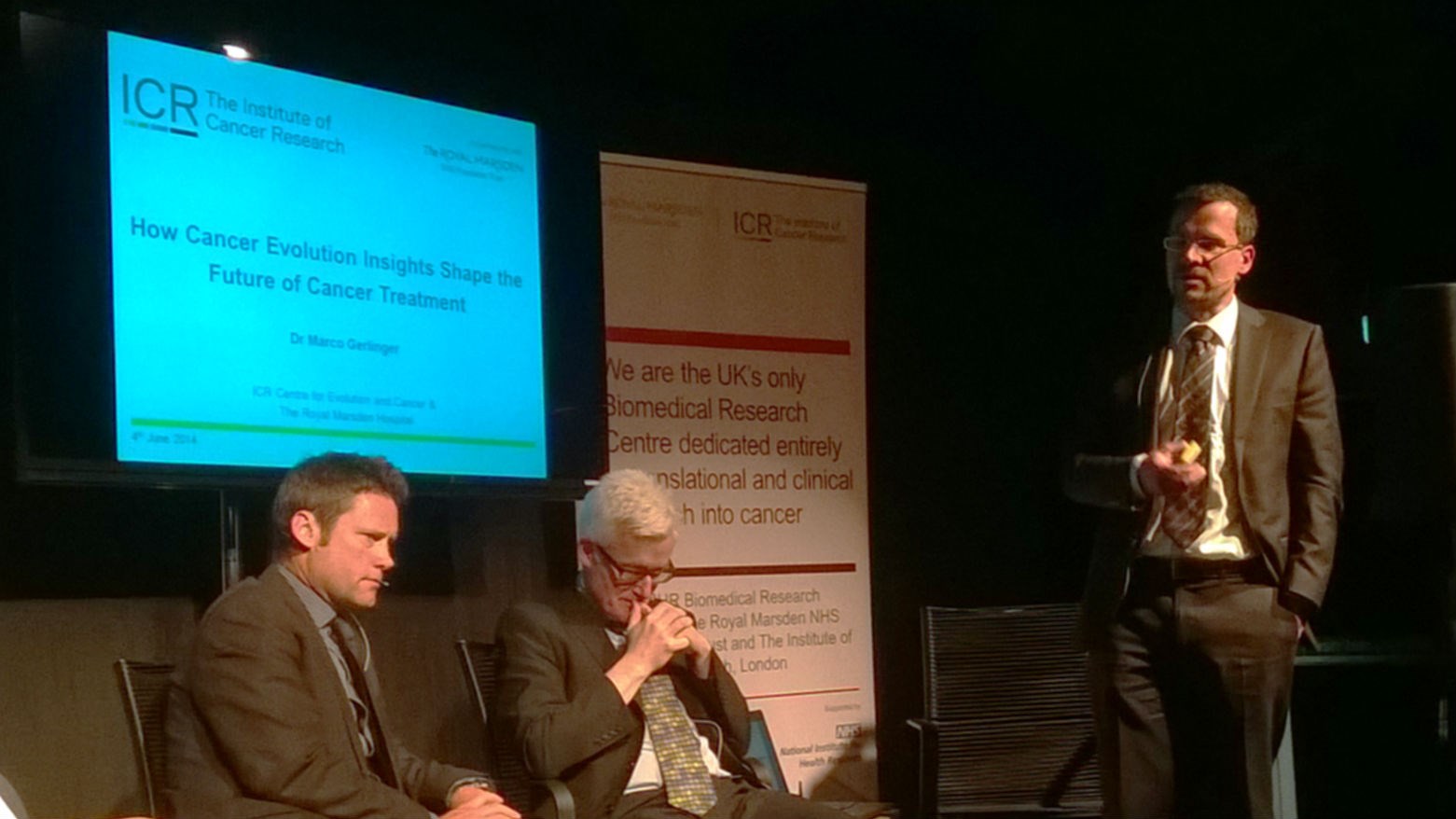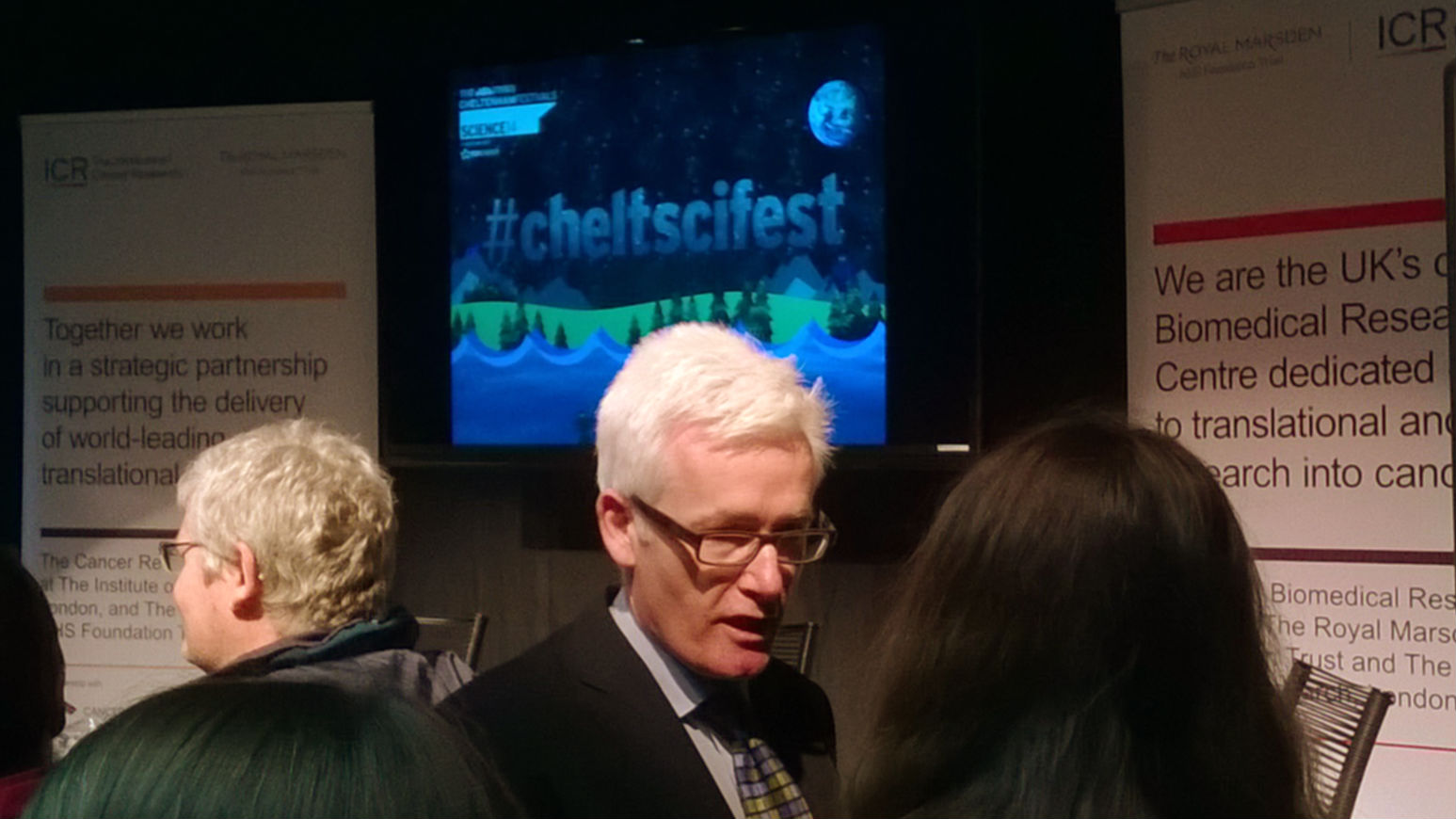Cancer's ability to evolve and resist treatment is the biggest challenge facing cancer research – but imaginative approaches such as advanced radiotherapy, drug combinations or immunotherapy are offering exciting new ways to fight the disease.
Leading researchers from The Institute of Cancer Research, London, and The Royal Marsden NHS Foundation Trust spoke about the future of cancer treatment at a special session of the Times Cheltenham Science Festival.
Sophisticated imaging techniques could help improve the effectiveness of radiotherapy, while new drugs could strip tumours of their defences against the effects of radiation.
Combining drugs together is also a promising approach to preventing resistance to treatment from evolving, just as combination antibiotics do against bacteria, or antiretrovirals against HIV.
And immunotherapy is generating excitement as a potential new way to fight cancer, by boosting a patient's own immune system and directing it against cancer cells.
 The ICR's Dr Gerlinger speaks at Cheltenham Science Festival
The ICR's Dr Gerlinger speaks at Cheltenham Science Festival
Dr Marco Gerlinger, a team leader within the Centre for Evolution and Cancer at the ICR and a consultant medical oncologist, is investigating how cancer evolves, so researchers can understand the challenge they are facing and learn to overcome it.
He explained:
- Cancer can readily adapt to changes in its environment – so often drug treatment is effective initially but ceases to work after a few months as the cancer becomes resistant.
- The evolutionary nature of cancer appears to explain this adaptability, with new mutations conveying advantageous characteristics such as drug resistance, and allowing adaptation through Darwinian selection.
- Understanding how cancers evolve is crucial for the development of treatments that can reduce the adaptability of cancers, or even change the direction of evolution to prevent drug resistance from emerging.
Dr Gerlinger said, "Targeted treatments attack specific genes or proteins to kill cancer cells, but we know that cancer can evolve quickly to evade these treatments. Tumours are made up of many discrete populations of cancer cells with different types of mutations, and if you don't target the right mutation then treatment-resistant cells will eventually dominate. We need to study the mechanics of these evolutionary processes so we can combat cancer more effectively, by identifying new ways to exploit cancer's weaknesses or even by changing the way in which the disease evolves."
 The ICR's Professor Harrington at Cheltenham Science Festival
The ICR's Professor Harrington at Cheltenham Science Festival
Professor Kevin Harrington, a clinician scientist at the ICR and an honorary consultant at The Royal Marsden, will be speaking at the festival about how high-tech advances to radiotherapy have the potential to greatly improve cancer treatment.
He explained:
- Radiotherapy is the most effective non-surgical treatment for cancer and is part of the treatment of about half of all patients cured of cancer - although treatment-related side effects can be severe and long-term.
- New techniques for the delivery of radiotherapy represent a huge advance in our ability to cure tumours with much less collateral damage. New developments in imaging technology to guide radiation delivery offer the prospect of a huge improvement in treatment outcomes.
- A new generation of targeted drugs are ideally placed to enhance the effects of radiotherapy in cancer cells, with minimal effects in normal tissues. Future studies will combine these biologically targeted 'radiosensitisers' with state-of-the-art radiotherapy to optimise patient outcomes.
Professor Harrington said, "Radiotherapy has revolutionised cancer medicine and is the most effective non-surgical cancer treatment. Our research uses sophisticated technology and imaging techniques to see the size and shape of a tumour and pinpoint exactly where it is in the body – meaning we can target the radiation to exactly where it is needed and reduce the damage to healthy organs. One very exciting avenue of research is the development of targeted drugs that strip tumours of their defences against radiation, making radiotherapy much more effective for treating cancer."
Dr James Larkin, a clinician at The Royal Marsden specialising in kidney cancer and melanoma, will talk about one of the most exciting new areas of cancer research – use of immunotherapy to direct a patient's own immune system against a tumour.
He explained:
- Most solid tumours, once they have spread, are not curable. Although 'cytotoxic' and 'targeted' drugs can extend life expectancy in a number of different types of advanced cancer, typically such drugs are effective only for a matter of months.
- Immunotherapy has been investigated for decades to treat cancer, particularly melanoma and kidney cancer. Historically cytokines such as interleukin-2 and interferon have been used to treat some cancers but these treatments are toxic and benefit only a small number of patients.
- The development of so-called T-cell checkpoint inhibitors such as ipilimumab, nivolumab and pembrolizumab over the last few years offers the prospect of treatments generally without major side-effects with the possibility of controlling some advanced cancers for years. Such treatments may offer a solution to the problem of resistance to targeted and cytotoxic therapies.
Dr Larkin said, "Over the last few years we have taken a huge step forward in developing treatments for patients with kidney cancer and melanoma. At The Royal Marsden we are excited to be leading the way in exploring new treatment options through immunotherapy to direct a patient's own immune system against a tumour. The advances we are making will benefit patients at our hospital and across the NHS."
The Cheltenham Science festival is one of the UK's leading science festivals, bringing together some of the world's greatest researchers in a six-day celebration of everything great about science.
The ICR and The Royal Marsden are presenting at the festival to promote their work within the Cancer Research UK Centre at the ICR and The Royal Marsden – a strategic partnership between the three organisations – and the NIHR Biomedical Research Centre at The Royal Marsden and the ICR, the only BRC to focus entirely on cancer.
For more information contact the ICR press office on 020 7153 5380 / [email protected]. For enquiries out of hours, please call 07979 751984.